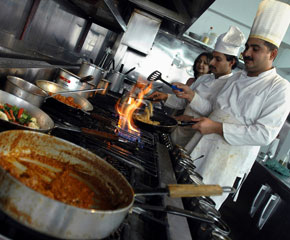At least 27 500 extra workers are needed if some of the nation’s favourite Asian meals such as chicken tikka masala are not to disappear from the high street, the Immigration Advisory Service (IAS) says.
A looming shortage of cooks and waiters, the result of the government’s new immigration points-based system, has left Bangladeshi restaurants in serious trouble and facing irreparable damage, IAS chief executive Keith Best said.
The issue has worried restaurant owners and workers in East London’s Brick Lane, famous for its inexpensive curry houses, sweet shops and stores selling everything from fresh fruit and vegetables to traditional Asian clothes.
“It seems the Asian people, not just Bangladeshi but also Chinese and Indian, have been targeted. This is wrong,” said Abdol Noor, who runs a small family-owned curry house in Brick Lane, also known as London’s Banglatown.
“When people go to Chinatown, they expect to have Chinese food served by Chinese people,” added the 35-year-old restaurateur whose family came to Britain over 30 years ago.
“When they come to Brick Lane, they expect to have curry. How will they feel if they are served by people of different cultural origins who probably don’t eat curry?”
Restrictions on lower-skilled migrants from outside the EU have left many Bangladeshis struggling to find work in Britain.
Limits have been tightened since migrants from new European Union member countries in eastern Europe gained employment rights in Britain following accession to the EU bloc.
The IAS’s Best said attempts to get eastern Europeans to work in curry restaurant kitchens have failed because they “have no cultural sensitivity towards or understanding of the curry industry”.
“The lack of appreciation of the crisis facing the industry could do it irreparable damage,” he said in a statement.
He has written to the immigration minister Liam Byrne asking for the rules to be relaxed for catering workers from Bangladesh.
He has also called on the British public “to save what has become an integral part of British life”.

